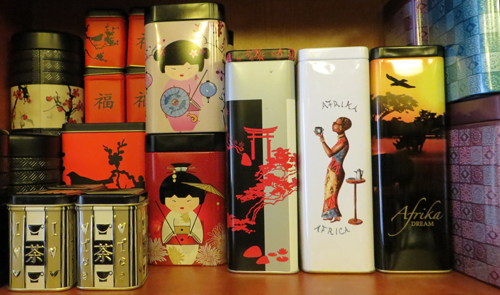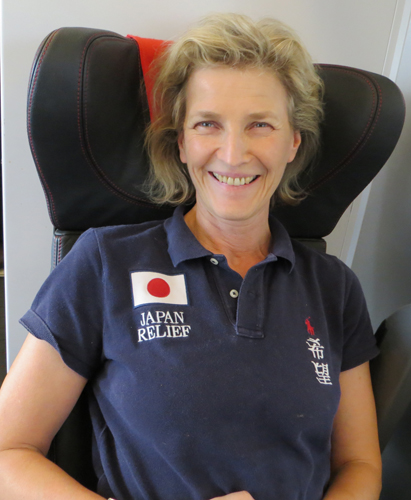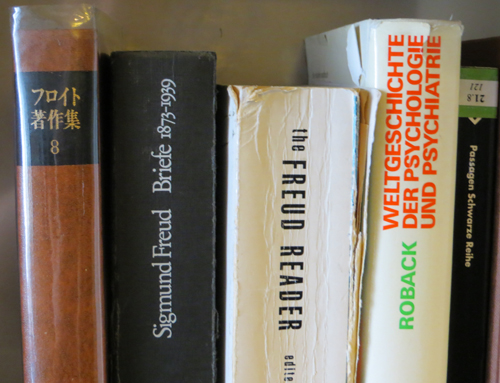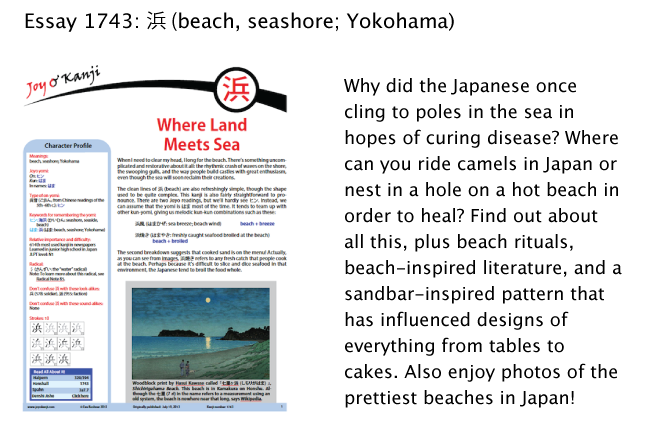Coming Home
お久しぶり(おひさしぶり)ですね! It's been awhile! I'm slowly reimmersing myself in kanji matters after a nine-day vacation in Europe. My husband and I visited Berlin, Prague, and Vienna with brief stops in Frankfurt, Wiesbaden, and Munich. (In Berlin we enjoyed meeting Rajorshi De, occasional winner of newsletter contests!)
It felt strange to turn my back on Japanese, as if I were cheating on it with German! I did, of course, take photos of kanji whenever I spotted them. I found them in a teashop in Prague:

Photo Credit: Eve Kushner
I encountered them on a train between Vienna and Munich!

Photo Credit: Eve Kushner
This woman told me that Ralph Lauren created and sold these shirts to raise money for victims of the 2011 tsunami. The word 希望 (きぼう) means "hope."
But that was less surprising than discovering them in the Freud Museum in Vienna!

Photo Credit: Eve Kushner
The Japanese render Freud's name as フロイト, not フロイド because they attempt to reproduce the way things sound in the original language. A d at the end of a German word sounds like a t. As 著作集 (ちょさくしゅう) means "writings, collection," the Japanese title translates as Writings of Freud: Volume 8.
I also spotted quite a few kanji in a Vienna museum about the artist and visionary architect who called himself Hundertwasser. He married a Japanese woman in the 1960s, and the paintings he did at that time included titles in kanji. Unfortunately, the museum prohibited photography, so I can't share those paintings with you. But perhaps you'll enjoy glimpses of him in 1961 Tokyo.
While traveling, I thought about language constantly. I pondered how it felt to be completely shut out of a language, as in the Czech Republic, where signs looked like this:

Photo Credit: Eve Kushner
Of course, not knowing a word of Czech eliminated any performance pressure. I could just sit back and admire the way the restaurant servers, hotel staff, taxi drivers, and shopkeepers effortlessly conversed in any number of languages.
But I felt a little uneasy, all the same, which made me consider my deep need to crack the code of other languages. Maybe it stems from nosiness! I want to know what everyone is saying! However, I think there's more to it than that.
Since April, I've been learning German through Rosetta Stone. I now yearn to build on what little I know. Since my return, I've polished off Disk 1 and am now ready to venture into the unknown territory of Disk 2. This is where all the juicy stuff is for travelers. I realize now that I had no hope of understanding people's directions when I didn't have even the basic vocabulary for "turn right" or "go straight" or anything of the sort. Disk 2 will prepare me well for the trip I just took!
I will say, though, that Disk 1 enabled me to meet my needs. It filled me with the idiotic confidence of the novice who has no idea just how complicated things can be. And a few practice sessions with the ultra-patient Ulrike Narins made me believe that a native speaker could easily understand me. During my trip, I started countless German conversations, and people understood me every time. It was quite magical in that respect. Also, not a single person laughed at me, even when I said, "I visit a taxi," instead of "I need a taxi." I'm not sure I would have been as kind!
Unfortunately, people everywhere failed to stick to the limited vocabulary from Disk 1! As a result, I would ask a question, hear a stream of rapid German in reply, and then ask in German whether they spoke English. They almost always did—and quite beautifully. I soon began to wonder why I was wasting any of our time by starting in German when I could only go so far with it. I told myself I didn't want to be a presumptuous, imperialistic, ethnocentric American. (What a lot of baggage I carry on my travels!) I also didn't wish to burden strangers with the effort of speaking English. Aside from that, though, I spoke in German at every opportunity simply to see if I could. I wanted to know whether my talks with my computer bore any correspondence to real-world German.
This matter brings to mind two wonderful Japanese expressions:
畳水練 (たたみすいれん: book learning (which seems as useless as practicing swimming on a tatami mat))
畑水練 (はたけすいれん: book learning (which seems as useless as practicing swimming on dry land))
I don't want to swim on a dry surface! I long to swim in the ocean—or at least dip my foot in a more manageable puddle!
I feel impelled in the strangest way to study German, even though I don't know why. There's something deeply familiar about this language, perhaps as a cousin to Yiddish, which was sprinkled into my childhood ever so lightly. German also sounds a bit like Hebrew and French, both of which I have studied. But German most likely feels familiar because it's the ancestral form of English. This makes me think that German already exists inside me at some deeply unconscious level and just needs to be coaxed out. That is a pretty crazy idea, but that's where I am with it, and I'm answering the call of the wild idea.
I also want to continue because I love Rosetta Stone! It feels like heresy to say this, when Joy o' Kanji embraces the opposite approach. After all, the essays examine every nook and cranny of an issue because I believe that if you engage with something fully, you stand a much better chance of understanding and remembering it. I still stand by this, of course. But my approach works better for intermediate learners. When you're just starting a language, the point-and-click approach is immensely reassuring. It limits the material and the ways in which you might go awry.
While I'm singing the praises of online learning, I'm pleased to introduce some kanji games that Oliver Rose has developed and brought to my attention. Cleverly designed, they're helpful and challenging, and they make for addictive playing. They're a great way to test your knowledge of on-yomi, in particular. The games exist both as mobile apps and on the web. Check them out here:
Lex Word Game app, which Rose describes as a cross between Boggle, a crossword puzzle, and mah-jongg.
Don't miss the game (in the Lex for Japanese menu) that challenges you to locate four-character compounds!
Playing the games on the site is free, as is the Lex Word Game app. Meanwhile, the Kanji Connect mobile app has a free version, a JLPT N5 version (125 kanji, $1), and a full version (JLPT N5–N2, 1000+ kanji, $4).
I'll admit that when I first looked at these games, I froze, feeling that I knew nothing. Then I found myself operating from my gut, rather than my brain, and for some inexplicable reason, this seemed to be the way to go. In any case, it turned out that I knew far more than I thought I did. I bet you'll have the same experience.
Please let me know what you think of these tools. I might integrate them into Joy o' Kanji!
To round out the fun and games, I'd like to bring you to the beach! That is, essay 1743 on 浜 (beach, seashore; Yokohama) is now up. Here's a preview:

Have a great weekend!

Comments